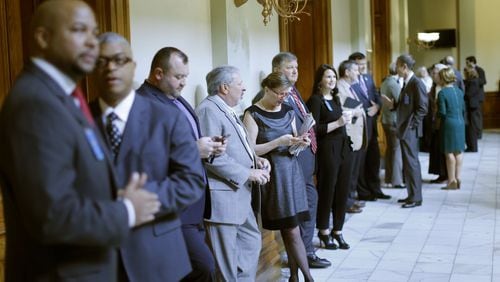State law requires lobbyists to register and report their spending on public officials, but many believe there is a hidden army of lawyers, business executives, issue advocates, and state government employees who work feverishly to pass, alter or kill bills but do so without registering as lobbyists.
Stefan Ritter, executive director of the State Ethics Commission, said lobbyists perform an important function by advising and educating a part-time Legislature on the possible effects of new laws. But the public deserves to know who they are, he said.
“There is nothing wrong with lobbying,” he said. “But the public should be able to look at who is lobbying.”
Are there a lot of unregistered lobbyists at the Capitol?
“I’ve been told there is a problem with that,” Ritter said.
That’s like saying the captain of the Titanic had been told there was a problem with the boat. But Ritter’s understatement is rooted in the fact that proving someone is lobbying without registering is hard.
Lobbying is a personal business and much of it is done in private between an advocate and a policymaker, sometimes in a restaurant or bar away from prying eyes in the Capitol. Other times, it is a phone call to a lawmaker from a downtown high rise or an office in Washington. To catch a lobbyist doing so without disclosing their business would mean someone would have to squeal.
“That does not happen as much as we like,” Ritter said. “We don’t have investigators waiting around the General Assembly waiting to see if they spy any lobbying to take place.”
The issue is a hot one for Trip Martin, one of the state’s most influential lobbyists. Martin represents a variety of interests at the Capitol, including the Atlanta Braves, Comcast and the state’s hospital association. We know this because Martin reports it all publicly, and he believes there are too many who not playing by the rules.
Martin said he believes these lobbyists don’t want to register, either because they don’t want to disclose who they are working for and what they are spending or they just don’t want the “scarlet letter” attached to them.
Last year, Martin accused anti-tax crusader Grover Norquist of breaking state law by failing to register as a lobbyist when he warned lawmakers not to pass a transportation tax bill.
Norquist and his group, Americans for Tax Reform, encourage politicians to sign a pledge saying they will oppose “any and all efforts to raise taxes,” and according to the group’s website, about 1,400 have done so, including some three dozen state lawmakers.
Martin said Norquist’s efforts to defeat the bill by reminding legislators of their pledge is lobbying and he should be required to register. Norquist, through his attorneys, disagreed. In a letter to the state ethics commission, Americans for Tax Reform said the organization’s activities did not trigger the state law requiring registration, but even if it had, the law is “constitutionally vague.”
“ATR has retained no person for the purpose of contacting any Georgia official nor has ATR made any expenditures for paid communications regarding the proposed tax increase, although we reserve ATR’s constitutional rights to do both,” an attorney for the organization replied.
So far, nothing has come of Martin’s complaint, but ethics commission attorney Robert Lane said the investigation remains open. But Norquist’s group hasn’t forced the issue. Lane said the group was quiet during the 2016 session.
“I want to see what happens this legislative session,” he said.
The 2013 ethics reforms passed by the General Assembly instituted the first limits on what registered lobbyists could spend on lawmakers, capping meals and other goodies at $75 per gift. While it was hailed as a positive step to change the climate at the Capitol, the same law did little to address unregistered lobbying. In fact, it made it worse.
First, government lobbyists — staffers colloquially called “legislative liaisons” — who press lawmakers endlessly about the size of their agency budgets were removed from the officials definition of lobbyists and no longer have to register. Along with liaisons from executive branch agencies, the law also exempted university lobbyists, who for years had been some of the biggest spenders at the Capitol, from registering or reporting their spending.
In addition, the reforms gave attorneys more cover to avoid registering with the state as lobbyists by specifically exempting them in cases where they are “not compensated for the specific purpose of lobbying.” The result is some large firms have stacked their lobbying arms with licensed attorneys who are not registered as lobbyists.
Advocate or lobbyist?
House Speaker David Ralston, R-Blue Ridge, believes strongly there is another category of unregistered lobbyists the state should require to register: issue advocates who spend much of the legislative session pressing lawmakers to vote their way.
Ralston has made a couple of attempts to capture this group, most recently with a language inserted into a bill aimed at requiring these "mystery groups" to disclose their spending. A coalition of conservative activists, including Norquist's group, opposed the measure and the language disappeared.
Ritter acknowledges the current registration law has its quirks, but he said the general intent is clear.
“The lobbying line is when someone is paid to advocate for the passage or oppose legislation,” he said. “If you are paid to do that then you are lobbying and should register.”
One strength of the law is the bar for being a “paid” lobbyist is very low. Anyone receiving at least $250 annually in salary or reimbursement while lobbying for or against a bill is required to register.
Registration isn’t some academic exercise or bureaucratic hurdle, Ritter said. “Some countries do not even allow lobbying in any manner. We do. Our country and state have chosen to allow lobbying but to regulate the practice,” he said. “We’ve said that is OK, but you have to disclose that you are doing that. If we didn’t do that then the process of representative democracy would be undercut.”
It’s government transparency at its most basic. If you are trying to influence how laws get made, you should be required to state who you are and what interests you represent.
Right now, many believe that isn’t happening under the Gold Dome.








